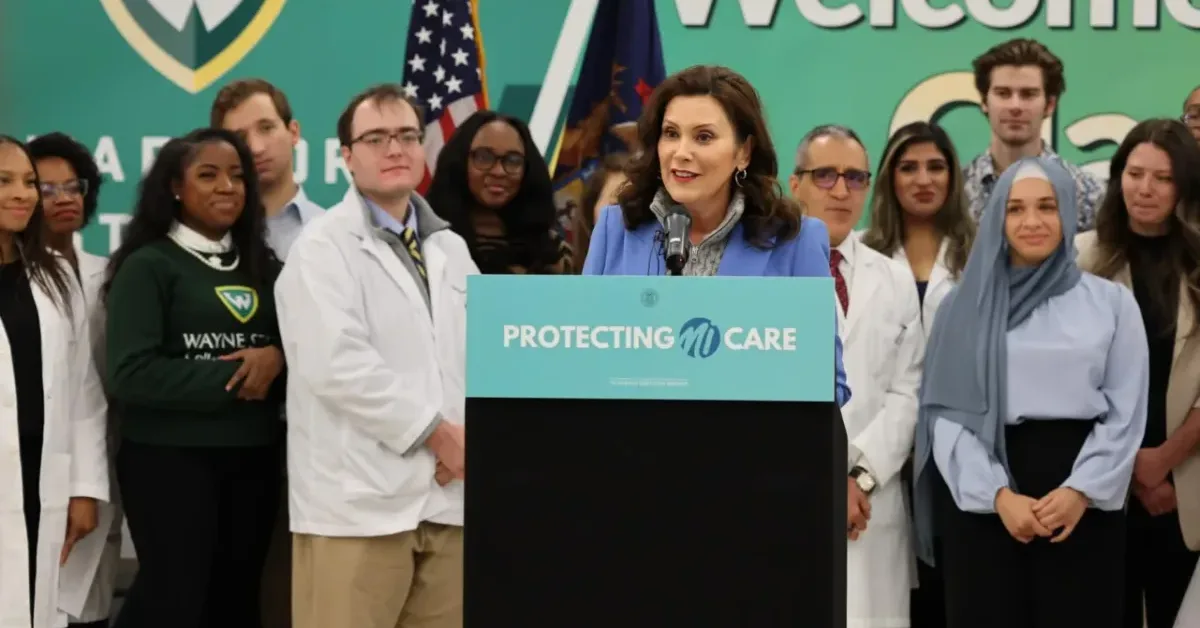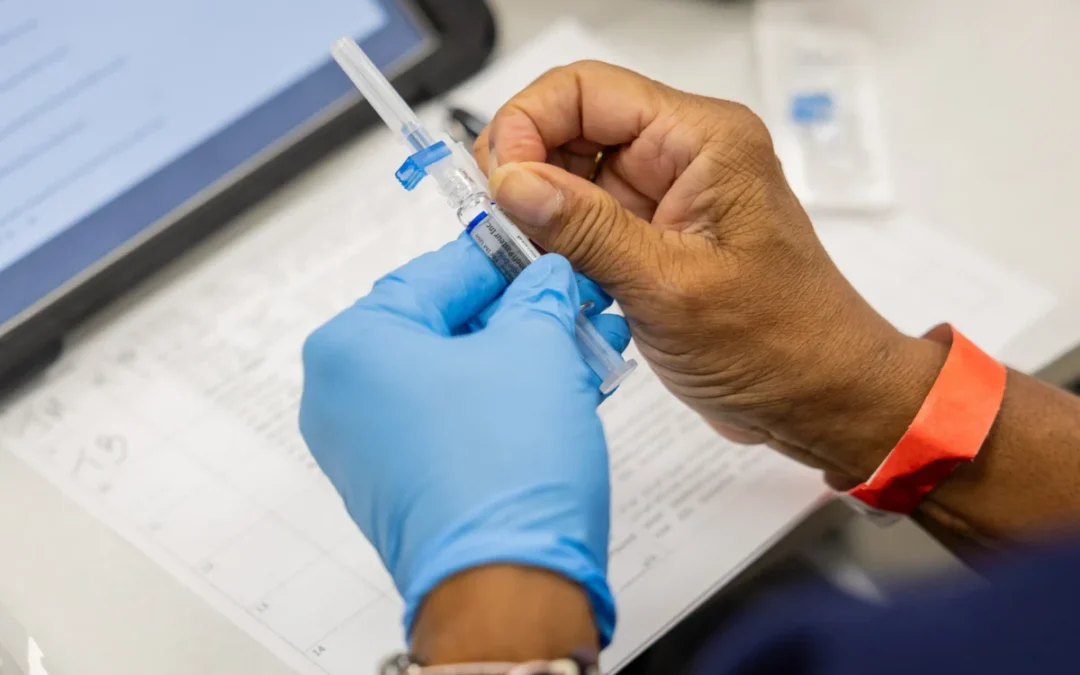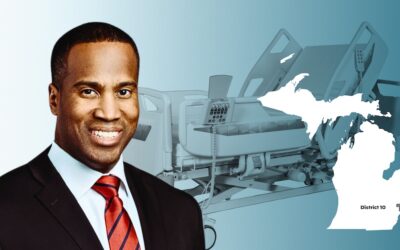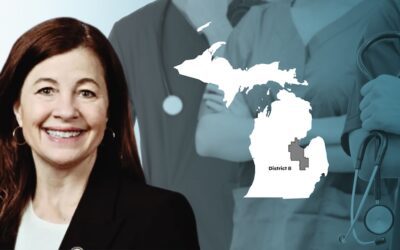
BY KYLE DAVIDSON, MICHIGAN ADVANCE
MICHIGAN—In her newly released budget recommendations for Fiscal Year 2025, Gov. Gretchen Whitmer proposed an additional $1.96 billion in funding for the Michigan Department of Health and Human Services (DHHS), including funding for new behavioral health clinics and continuing support for programs to address racial disparities in health care.
Whitmer’s budget proposal totals $80.7 billion. Should the Legislature adopt Whitmer’s recommendations, DHHS would receive $37.6 billion in funding for FY 2025, compared to the $35.7 billion allocated for the current fiscal year which lasts through Sept. 30.
A breakdown of the proposed FY 2025 budget from the governor’s office spotlighted various public health provisions:
- $193.3 million to establish new Certified Community Behavioral Health Clinic sites across the state, which would serve as many as 50,000 additional individuals.
- $15.7 million to continue the Healthy Moms, Healthy Babies program which is aimed at supporting new and expectant mothers and addressing racial disparities in infant and maternal mortality.
- $24 million to provide new funds to communities that identify innovative approaches to support expectant parents and newborns.
- $1.8 million to support the MIChild, which provides health and dental insurance for uninsured children of working families for $10 a month per family.
- $7.3 million for the Michigan Crisis and Access Line to ensure access for individuals experiencing behavioral health crises.
The FY 2025 budget would also create the Caring for MI Family Tax Credit, which would provide families who care for an aging or sick relative up to $5,000 off their taxes.
Whitmer’s office also highlighted $35 million to implement recommendations from the Coronavirus Task Force on Racial Disparities, including neighborhood health grants, mobile health units and sickle disease support.
In addition to the provisions spotlighted by Whitmer, her FY 2025 recommendations include a total of $5.1 billion in behavioral health provisions, and $22.1 billion for health services. In FY 2024, $4.79 billion was allocated for behavioral health and $19.3 billion was set aside for health services.
The proposed FY 2025 budget would also boost funding for health services under the Healthy Michigan Plan, which provides low-cost health care services to qualified Michiganders ages 19 through 64.
The current FY 2024 budget allocates just over $1 million for the administration of the program, as well as $590 million for behavioral health services and $5.32 billion for health services. Whitmer’s proposed FY 2025 budget would provide an additional $30,200 for administration, while allocating $535 million for behavioral health and $6.35 billion for health services.
The proposed FY 2025 DHHS budget also includes more than $160 million for community services and outreach and $756 million for local office operations and support services.
It would also provide more than $273 million to local health and administrative services, including $110 million supporting 79.5 full-time equivalent jobs in AIDS testing, prevention and care programs; $15.9 million funding 18 full-time equivalent positions in cancer prevention and control; $8.55 million supporting 20 full-time equivalent positions for sexually transmitted disease control; and $76.4 million for essential local public health services.
Whitmer’s FY 2025 budget proposal also includes $2.34 million to monitor blood lead levels in children and reduce the number of children in the state with elevated levels of lead in their blood.
In a statement, Caring Across Generations—a coalition of more than 100 local, state and national organizations focused on supporting caregivers, care recipients and their families—praised the budget’s focus on aging, disability care, and child care workforce support.
Jaimie K. Worker, the group’s director of public policy, spotlighted the Caring for MI Family Tax Credit, as well as the establishment of the Home Health Care Public Authority. Once established the authority would provide supportive services—including program orientation, training and patient matching services for home health care workers—to Medicaid enrollees accessing eligible community-based supports, their families, and the people who serve them.
While Worker also applauded Whitmer’s proposed increases to funding for childcare providers and financial assistance for child care workers to offset child care costs for their own children, she urged action on these proposals from the governor and the Legislature.
These proposed investments mark significant progress for Michigan’s caregivers and those they support. It’s a step in the right direction, yet it’s crucial that proposals become actions,” Worker said.
READ MORE: 7 ways Whitmer’s new budget plan invests in Michigan kids and schools
This coverage was republished from Michigan Advance pursuant to a Creative Commons license.

A new car vs. health insurance? Average family job-based coverage hits $27K
By Phil Galewitz, KFF Health News With the federal shutdown entering its fourth week, spurred by a stalemate over the cost of health insurance for...

Fighting a health insurance denial? Here are 7 tips to help
By: Lauren Sausser When Sally Nix found out that her health insurance company wouldn’t pay for an expensive, doctor-recommended treatment to ease...

It’s almost flu season. Should you still get a shot, and will insurance cover it?
Madison Czopek, PolitiFact August 18, 2025 For parents of school-aged children, the fall to-do list can seem ever-growing. Buy school supplies. Fill...

Opinion: Health care is at risk as Grad PLUS loans face the chopping block
The ‘One Big, Beautiful Bill Act’ strips critical funding from medical students and threatens care in rural and underserved communities. We never...

Macomb County households will start losing money this year under Trump’s new spending law. Here’s how much—and who let it happen
Families in Michigan’s 10th Congressional District will shoulder over $500 million in lost funding, while billionaires cash in. In the neighborhoods...




